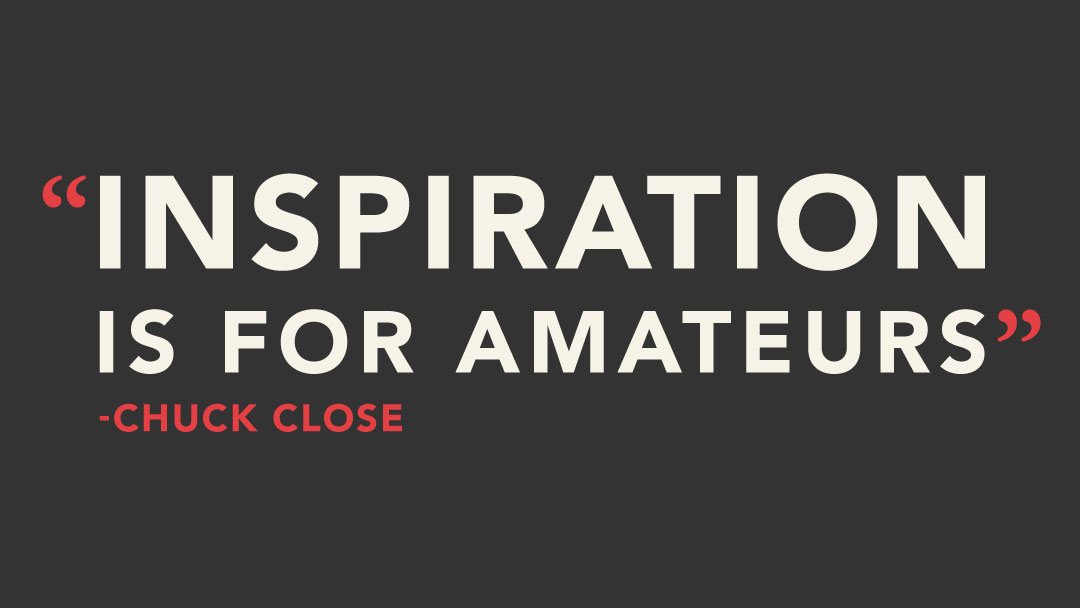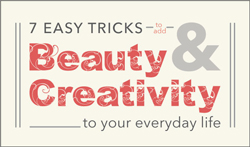“Inspiration is for amateurs.” – Chuck Close
Several years ago, I started reading interviews with working, professional artists. A common theme stood out among most of their narratives: these weren’t people who woke up in a halo of inspiration shining down from the heavens each morning to guide them effortlessly into creating masterpieces. These were people who pushed through self-doubts, struggles and dry spells and DID THE WORK. That amazed me. Naïve it may be, but I had no idea until reading those interviews that an unwavering, daily commitment to producing artwork, regardless of mood, inspiration or external factors was the number one factor in whether or not an artist “made it.”
This concept—that showing up and working hard mattered at least as much as talent—transformed my thinking about how creative work gets done. Here are four things I took away from those interviews:
Your most important audience is yourself: Do the work because you love it and don’t worry about what other people think.
I used to feel so paralyzed worrying about how people would perceive my artwork (and by extension, me!) that I was editing myself even as I was creating, and I couldn’t get anything done. There is a place for criticism of your work and honest feedback, but the beginning of the creative process (the getting-down-to-work part) is not it.
A few years ago, I read a book called The Van Gogh Blues, which helped me realize that my constant internal barrage of doubts about my talent, skepticism about my ability to earn income from art, and fear of peoples’ opinions is irrelevant—if I don’t create art, I don’t feel alive, calm, whole. Whatever comes of it, I need to do it; it gives me a connection to something bigger than myself and my life and keeps my mental well-being intact. I hope that some people will like it and buy it, but even if they do not, I am compelled to keep making it.
Creative work is a long game.
I’ve realized that making a living as an artist requires the long, regular pacing of a marathon. I show up most days, even when I am tired, bored, uninspired or filled with self-doubts. I push through those feelings with regular work until I hit upon something that excites me and propels me toward my next piece.
Even if you’re not a professional creative, know that creative work of any kind (whether it’s a hobby or side business) is a long-term process. Some days will be good and some will be bad. You’ll feel inspired to knit some nights after work, and other nights you’ll just be too tired to pick up the needles. That’s okay. Take the long view and know that regular, small creative efforts all add up over time.
Just because something isn’t comfortable doesn’t mean it’s not right.
I almost threw up when I sent out an email telling people that I was showing my work publicly for the first time; I was actually shaking when I hit “send.” But I did it, because a very wise advisor had drilled it into my head over and over that change doesn’t always feel comfortable. Even good change can feel bad at first.
It may feel weird and uncomfortable to pursue an idea when your brain is criticizing you non-stop. And like me, you may feel very, very exposed if you decide to put your work out into the world for people to see. Those feelings don’t mean that you should stop; they just mean that you’re shaking things up and trying something new. Ignore the discomfort and push through. I speak from experience when I tell you that it will get easier.
Most importantly, realize that you have something to offer.
Whether you’re canning a new recipe of jam, sewing gifts for the holidays, or doing simple potato prints with your kids, know that your efforts, however small, are adding something good into the world. There is beauty in everyday creation and it is what gives our lives meaning.
Everyone may not like my artwork, but some people do and they have told me they find it moving and beautiful. There is value in what I do, and there is value in what you do too.


 I create burned wood engravings that combine my love of the textures and patterns found in nature with a deep interest in the unconscious world of dreams, symbols and mythic folklore.
I create burned wood engravings that combine my love of the textures and patterns found in nature with a deep interest in the unconscious world of dreams, symbols and mythic folklore. 
Thank you for this article. Very Timely for me! BTW, I found you through Cory Huff’s sight The Abundant Artist.
Abundance from a new fan & follower.
Thank you, Beth!